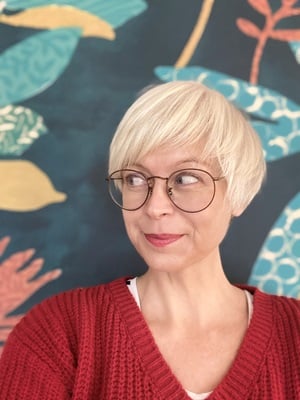
Sharp Writing
Kristina Valentine
I actually learned to write by writing. When I read my first texts today, I can certainly recognize my own tone of voice, but all the weird stuff around it obscures my view.
There was a lack of focus. That’s what I want to chat with you about today.
I don’t want to sound like a writing guide. There are lots of them out there, and many are very good and inspiring. I just want to tell you about my personal path to sharp writing.
First of all, there are rules for texts. People who read a lot usually already know them intuitively. That’s why reading is really good for writing.
If club-wielding orcs suddenly appear in a romance novel, this can quickly put readers off. Heroes dying in the middle of a novel is also rather unfavorable. In my stories, very few people die, so I’m on the safe side. Hero and heroine shouldn’t be separated for too long and shouldn’t only get to know each other in the last 100 pages.
“Show, don’t tell!”
To do this well, I really need to know the background of my characters. A lot of things can happen or be felt in passing, but the reader will still notice them. I don’t use a sledgehammer for this. Sometimes a small half-sentence is enough to sprinkle in some information.
During the writing process, I create a complete biography for each of my characters. I admit that it’s tempting to overwhelm my readers with all this information, but an info dump quickly leads to annoyance. Therefore: Let your character act authentically, don’t just report on them.
“Get to the point!”
If you don’t know what you want to say, you end up babbling. When I produce run-on sentences, I often don’t really know what I want to say. Either my character isn’t clear to me or there are gaps in the plot. If that’s the case, Randy Ingermanson’s snowflake method helps me, where I can go from a vague idea of the plot to a detailed plot plan. This is helpful to have a clear idea of why and from which mindset a character is acting. Then I can get back to the point. However, it is often the case that the detailed plot is allowed to develop, while the motives and intentions of my characters are very clear to me right from the start. But everyone is different. You just have to try it out.
“Know your characters inside out!”
What are their motivations, what are their specific goals, what are their strongest conflicts? And above all: What are they most afraid of? Fear is a powerful driving force, either to escape fear or to confront it. That is exactly what emotional development is all about. We face our fears. If we didn’t do this, our development could only take place within the boundaries that fear sets for us.
“Yes, you are the supplier of emotions!”
So empathize with how you reach your readers. Writing is not a one-sided game. Use people’s different channels of perception. Use them all! Not all the time, but every now and then:
Seeing
Hearing
Feeling
Smell
Taste
If I have done it well, there is a connection to my reader. They enter the same world I was in when I was writing.
“Write!”
I keep meeting people who tell me: I would love to write too. Or paint. Or dance. But many people believe that in order to be creative, you have to slip into a special outfit, go to a special place, or wait for time to suddenly become available.
I don’t believe that. We are born as highly creative beings who train our imagination very successfully over the course of our lives. Children are still completely uninhibited and creative without any pretensions. They can immerse themselves in their actions. In coaching terms, this is called “flow”. If you can really sink into an activity, you experience timeless moments. And that is extremely healthy. If we allow ourselves to do something just like that, i.e., without the thought of achieving a special or even outstanding performance, this is very beneficial in our meritocracy. (Which is a real challenge for many people and makes me want to write something about the powerful “inner critic”).
There will be no free time, no new writing program, and no visit from the muse (I don’t even know mine). You just have to sit down and write.
So, writing is healthy! You just have to do it! And if you do, then please be sharp!
About the Author
Kristina Valentine lives and works in northern Germany. She is constantly dreaming up new stories and writes every spare minute of her time.
Humorous and warm-hearted, she tells of the pitfalls of everyday life, which occasionally gets out of hand unexpectedly, of love, and of men who tend to turn the lives of their self-confident heroines upside down. She also loves coffee, her garden, and the slightly crazy terrier she shares an office with. She also publishes under the name Kristina Günak.

Similar Features
Querying a Mystery
How to Write a Query Letter That Won’t Get You Ghosted
Crafting the Character
Creating Characters as Mysterious as Your Plot
Subtext in Suspense Scripts
How Subtext Drives Suspense in Thrillers and Mysteries



